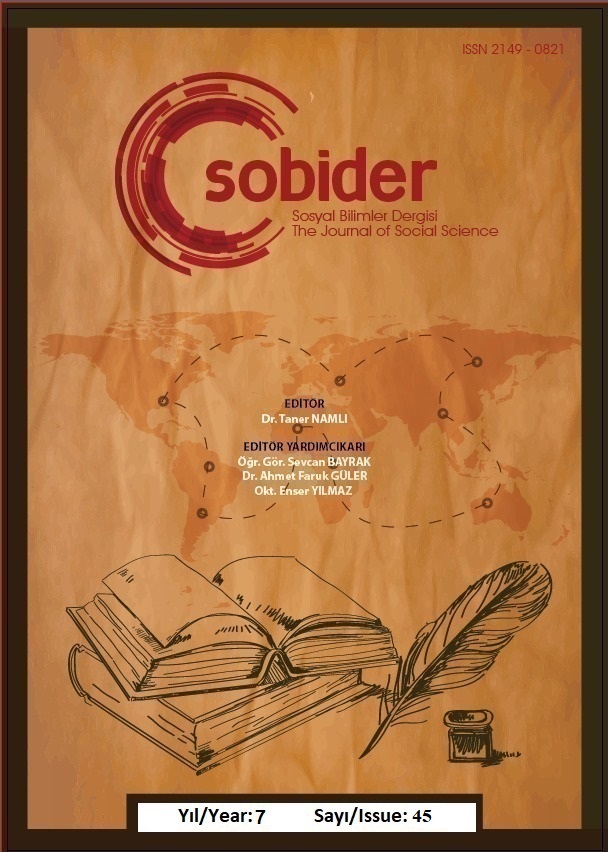Author :
Abstract
İnsanoğlunun toplu olarak yaşaması esastır. Bu birlikteliği esnasında kimi husumetlerin, mücadelelerin ve anlaşmazlıkların (savaşların) olması da esastır. Tamamen barış içerisinde bir dünya temenniden ibarettir. Bu temenniyi tümüyle mümkün kılmak belki mümkün değil; ama bir takım hukuki düzenlemeler yapmakla ve bir barış ortamı tesis etmekle sulha yaklaşmak imkansız olmaktan çıkabilir. Geçmişte yaşanan “milletler sistemi” ve “millet-i hakime”ye dayalı beraber yaşama örnekleri bugünün çokkültürlü, çokdinli, çok kimlikli ve çok etnisiteli postmodern dünyanın talepleriyle örtüşmemektedir. Din bu bağlamda birleştirici olduğundan daha fazla ayrıştırıcı bir fonksiyon icra eder. Tarihte en büyük kargaşa ve savaşların din yüzünden yapıldığını biliyoruz. Bu din (mezhep) savaşlarının da müesses din kurumu sahipleri (papaz, kardinal, haham, dini lider, vb.) tarafından güç elde etme (hegemonya) istekleri sonucunda ortaya çıktığı söylenebilir. Hoşgörü kavramına abanmak ise konuyu muğlaklığa mahkûm etmekle kalmaz; birlikte yaşamayı ötekini kabul etmeye razı bir duruma indirger. Rıza boyutu gelenek ve dinler açısında kabul edilemez bir durumdur. Birlikte yaşamak rızaya, beraber yaşamak hukuka saygıya dayanır ve heterojen ve kozmopolit toplumların bir mecburiyeti olarak varlığını sürdürür. Bu mec-buriyeti veya barışı yok eden en önemli etkenin ise siyaset olduğu örnekler üzerinden ifade edilebilir.
Keywords
Abstract
It is essential for human beings to live collectively. It is also essential that there are some hostilities, struggles and conflicts (wars) during this union. Completely peaceful world it is jast a wish. It is perhaps not possible to make this wish entirely possible; but by making some legal arrangements and establishing an atmosphere of peace, approaching the peace may not be impossible. Examples of coexistence based on the "system of na-tions" and "national judges" in the past do not coincide with the demands of today's multi-cultural, multi-religious, multi-identity and multi-ethnic postmodern world. The religion in this context shows distinctive function rather than unifying function. We know that the greatest turmoil and wars in history are due to religion. It can be said that these religious (sectarian) wars also emerged as a result of the desires of the owners of religious institu-tions (priests, cardinals, rabbi, religious leaders, etc.) to gain power (hegemony). To over-estimate the concept of tolerance does not only condemn the subject to ambiguity; it re-duces the willingness to live together to accept the other. Consent size tradition and reli-gions hungry broadcasting is unacceptable. Living together is based on consent, living to-gether respects the law and exists as a necessity of heterogeneous and cosmopolitan socie-ties. It can be stated through examples that the most important factor that destroys this obligation or peace is politics.
Keywords
- Akyüz, Gabriel, “Osmanlıda Bir Arada Yaşama Tecrübesi: Süryaniler”, Kutlu Doğum Haftası: “Hz. Peygamber ve Birlikte Yaşama Hukuku” Sempozyumu, DİB. Yay., Ankara, 2015.
- Alkan, Mustafa, “Osmanlı’da Millet Sistemi”, Emperyalizm ve Ermeni Meselesi Uluslararası Sempozyumu, Esam, Ankara, 2015.
- Anderson, Benedict, Hayali Cemaatler: Milliyetçiliğin Kökenleri ve Yayılması, çev. İskender Savaşır, Metis Yay., İstanbul, 2017.
- Aktay, Yasin, Küreselleşme-Çokkültürlülük-Sahicilik, Tezkire Yay., İstanbul, 2015
- Altınöz, İsmail, Osmanlı Toplumunda Çingeneler, Türk Tarih Kurumu Yay., Ankara 2013.
- Altınöz, İsmail, “XVI: Yüzyılda Osmanlı Devlet Yönetimi İçerisinde Çingeneler”, ed. Suat Kolukırık, Yeryüzünün Yabancıları Çingeneler, Simurg Yay., İstanbul, 2007
- Aydın, Mahmut, “Paradigmanın Yeni Adı: Dinsel Çoğulculuk”, (ed.) Mahmut Aydın, Hıristiyan, Yahudi ve Müslüman Perspektifinden Dinsel Çoğulculuk ve Mutlaklık İddiaları, Ankara Okulu Yay., Ankara, 2005.
- Başdemir, Hasan Yücel, “Bir arada Yaşamanın İlkeleri”, (ed.) Ahmet Kavlak - Muhammet Enes Kala, Hece Yay., İstanbul, 2015.
- Çelik, Vasfiye, Fikret Çelik, Sefa Usta, “Yerel Demokrasi ve Yerel Özerklik İlişkisi”, Niğde Üniversitesi İktisadi ve İdari Bilimler Fakültesi Dergisi, Aralık 2008
- Demirci, Abdurrahman, “Medine Vesikası: Oluşum Süreci ve Zimmet Antlaşmalarına Etkisi”, İstem Dergisi, Yıl:10, S.19, 2012.
- Erözden, Ozan, Ulus Devlet, Levha Yay., İstanbul, 2003.
- Eryılmaz, Bilal, Osmanlı Devletinde Millet Sistemi, Ağaç Yay., İstanbul, 1992.
- Güleryüz, Naim A., “Osmanlıda Bır Arada Yaşama Tecrübesı-Yahudıler”, Kutlu Doğum Haftası: “Hz. Peygamber ve Birlikte Yaşama Hukuku” Sempozyumu, DİB. Yay., Ankara, 2015.
- Hacettepe Üniversitesi Göç ve Siyaset Araştırmaları Merkezi (HUGO) tarafından gerçekleştirilen “Türkiye’deki Suriyeliler: Toplumsal Kabul Ve Uyum Araştırması”. (2014 verilerine göre) https://data2.unhcr.org/en/documents/download/46184
- Halakaçayır, Hasan, Aşarlar-Son Göç, Karahan Yay, Adana,2016.
- Hamidullah, Muhammed, İslam Peygamberi, çev. Salih Tuğ, İrfan Yay., İstanbul 1995.
- Işın, Ekrem, İstanbul’da Gündelik Hayat, Y. K. Y. Yay., İstanbul, 2006.
- Kapat, Kemal, Osmanlı Nüfusu 1830-1914, Timaş Yay., İstanbul, 2010.
- Karakuş, Rahmi, “Birlikte Yaşamak Ne Anlama Gelir?,” ed. Ahmet Kavlak - Mu-hammet Enes Kala, Birlikte Yaşamak, Hece Yay., Ankara, 2015.
- Kavlak, Ahmet, “Birlikte Yaşama problemi açısından Irkçılık, Ümmetçilik, Mezhepçilik”, ed. Ahmet Kavlak - Muhammet Enes Kala, Birlikte Yaşamak, Hece Yay., Ankara, 2015.
- Kılıç, Rüya, "Osmanlı Devletinde Yönetim Nakşibendi İlişkisine Farklı Bir Bakış; Halidi Sürgünleri", Tasavvuf İlmi ve Akademik Araştırma Dergisi, S.17, İstanbul, 2006.
- Kılınç, Zeynel Abidin,” Çokkültürlülük ve Millet Sistemi”, PESA International Journal of Social Studies, June 2017.
- Kolukırık, Suat, Dünden Bugüne Çingeneler, Ozan Yay., İstanbul, 2008.
- Kolukırık, Suat, Yeryüzünün Yabancıları Çingeneler, Simurg Yay., İstanbul, 2007
- Kunduracı, Nevzat Fırat, “İslam Medeniyetinde Birlikte Yaşama Kültürü”, Sosyal Politika Çalışmaları Dergisi, Yıl: 15 S.: 34, 2015.
- Küçükalp, Kasım, Nietzsche ve Postmodernizm, İstanbul, 2003.
- Külekçi, Cahit, “Osmanlıda Birlikte Yaşama Tecrübesi Ermeniler”, Kutlu Doğum Haftası: “Hz. Peygamber ve Birlikte Yaşama Hukuku” Sempozyumu, DİB. Yay., Ankara, 2015.
- Nacracas, Georgios, Anadolu ve Rum Göçmenlerin Kökleri, Çeviren: İbram Onsunoğlu, Belge Yay., İstanbul, 2003.
- Ortaylı, İlber, “Millet Sistemi”, Tanzimat’tan Cumhuriyet’e Türkiye Ansiklopedisi, Cilt: 4, İstanbul, 1985.
- Ozil, Ayşe, Anadolu Rumları, çev. Ali Özdamar, Kitap Yay., İstanbul, 2016.
- Özkan, Mustafa, Medine Vesikası/Anayasası ve Birlikte Yaşama, Fecr Yay., İstanbul, 2018.
- Sarıbay, Ali Yaşar, “Kent: Modernleşme ve Postmodernleşme Arasındaki Köprü”, (ed.) Ferzan Bayramoğlu Yıldırım, Kentte Birlikte Yaşamak Üstüne, WALD. İstanbul Akademisi Yay., İstanbul, 1996.
- Sırma, İhsan Süreyya, “Medine Vesikasının Mevsukiyeti İle İlgili Bazı Veriler”, Bilgi ve Hikmet, S. 5, İstanbul, 1994.
- Sözer, Selim, Gelenekten Modernliğe İskenderpaşa, Meriç Yay., İstanbul, 2019.
